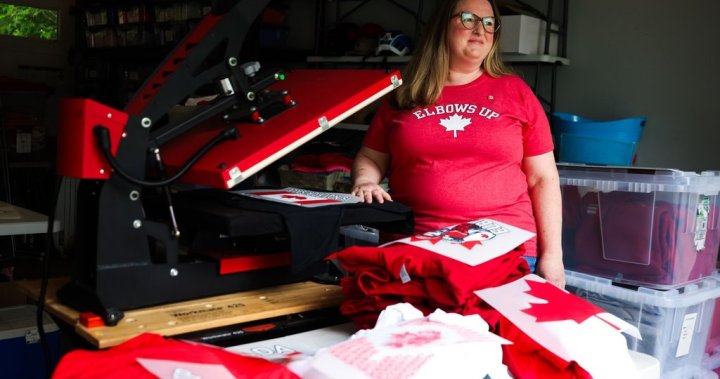When Rachael Coe decided to launch an “elbows up” merchandise line at her store in Yarmouth, N.S., in March, she said it was an immediate bestseller.
Within a week, Coe said her Timeless Memories shop had already made 400 sales. By the end of the first month, she had sold 2,500 products ranging from T-shirts to hoodies to car decals.
Demand for items bearing Canada’s rallying cry against U.S. President Donald Trump’s tariffs and annexation threats was so high that Coe launched a website to keep up with the surge.
“It was a response from all over Canada,” she said. “We reached every single province then we started covering worldwide. Our ‘elbows up’ merch went everywhere.”
Many Canadian businesses hopped on the patriotic trend that also saw Ontario Premier Doug Ford wearing a “Canada is not for sale” ball cap ahead of a January meeting with Canada’s premiers and prime minister.
But Coe’s sales started slowing down by May. And despite a slight boost ahead of Canada Day, she said the “elbows up” line is now selling at similar rates to the classic red-and-white merchandise she sells every year around this time.
Although business owners say they are selling more Canada-themed products this year leading up to July 1, many have also noted a decline in “elbows up” merchandise sales.
The rallying cry, initially embraced as a grassroots movement at the height of cross-border trade tensions and Trump’s musings about making Canada the 51st state, has shifted to a more generic expression of Canadian pride amid continued tensions, retailers and experts say. Others note that the phrase “elbows up” has increasingly been used in a partisan context, contributing to the marketing shift.

Stephanie Tomlin, Toronto-based owner of the online business Shop Love Collective, said she saw an explosion in “elbows up” merchandise sales in March, selling as many as 10 or 15 products per day. Similarly, her sales began to stagnate in May.
Leading up to Canada Day, she said she’s selling “quite a bit more” merchandise compared with previous years, but that’s due to interest in Canada-themed products across the board.

Get daily National news
Get the day’s top news, political, economic, and current affairs headlines, delivered to your inbox once a day.
“I think the climate in Canada is a little bit more settled after the election and that … we feel like we will never be the 51st state,” Tomlin said, adding that Canadian patriotism is becoming less combative as annexation talks have died down.
Howard Ramos, a professor of sociology at Western University, said “elbows up” became “more partisan than it used to be” when Prime Minister Mark Carney embraced the phrase in his election campaign ads in late March.
“It’s just added to how the expression is dying down as a pan-Canadian claim,” he said. “Now you see on social media, especially from Conservative handles, the use of ‘elbows up’ in a sarcastic way to criticize Mark Carney or Liberal policies.”
Negative online comments about the “elbows up” movement have discouraged Coe from promoting her products on Facebook. But when she’s interacting with customers in her Yarmouth shop, she said the phrase isn’t as divisive.
“It’s not a political term, and it simply means that you’re defending your country, and everyone should be defending our country, just like you would defend (against) a goal in hockey,” Coe said.
Danielle McDonagh, owner of Vernon, B.C.-based Rowantree Clothing, said she stopped promoting her “elbows up” merchandise on a large scale when she noticed the phrase being interpreted as an “anti-Conservative” and “boomer” movement.

For McDonagh, increased concern about the political climate in the United States has also chipped away at the lightheartedness of the “elbows up” movement.
“I think some of the levity is gone for me,” she said.
While sales of her “elbows up” products have dropped by about 90 per cent since hitting 1,000 in the first month, she said she continues to promote the merchandise in small batches at local markets in Vernon.
Business owners say their customers continue to prioritize supporting the Canadian economy, as they are routinely answering questions about where their products are manufactured.
And the push to buy Canadian isn’t just coming from this side of the border. Coe said many American tourists arriving by ferry from Maine visit her shop in search of Canadian merchandise.
“(Tourists) want to support us just as much as Canadians want to support us,” Coe said.
McDonagh said her business sees similar interest from Americans.
“I’m shipping a lot of Canada-centric merchandise to the States, which I just love,” McDonagh said. “People chat with me on my site and say … we’re supporting you.”
© 2025 The Canadian Press




